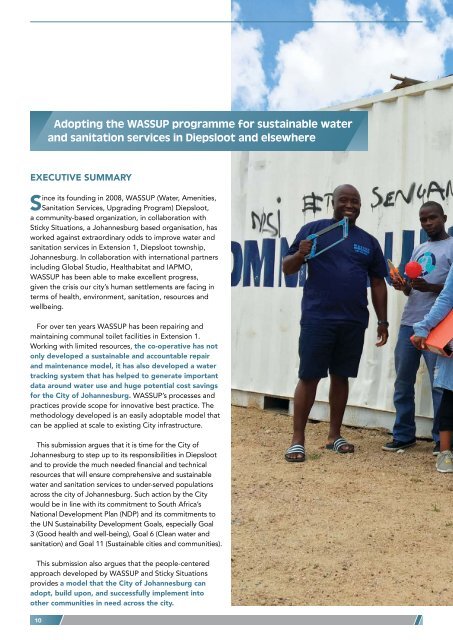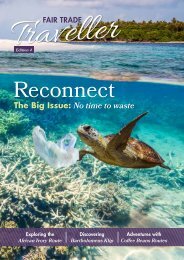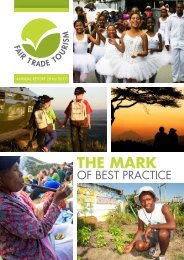WASSUP Diepsloot, Report March 2019
WASSUP Diepsloot: A proven grassroots program which prevents the loss of one billion litres of water per year in one extension of the Johannesburg township, where 39 households share one toilet.
WASSUP Diepsloot: A proven grassroots program which prevents the loss of one billion litres of water per year in one extension of the Johannesburg township, where 39 households share one toilet.
Create successful ePaper yourself
Turn your PDF publications into a flip-book with our unique Google optimized e-Paper software.
INTRODUCTION<br />
Adopting the <strong>WASSUP</strong> programme for sustainable water<br />
and sanitation services in <strong>Diepsloot</strong> and elsewhere<br />
EXECUTIVE SUMMARY<br />
Since its founding in 2008, <strong>WASSUP</strong> (Water, Amenities,<br />
Sanitation Services, Upgrading Program) <strong>Diepsloot</strong>,<br />
a community-based organization, in collaboration with<br />
Sticky Situations, a Johannesburg based organisation, has<br />
worked against extraordinary odds to improve water and<br />
sanitation services in Extension 1, <strong>Diepsloot</strong> township,<br />
Johannesburg. In collaboration with international partners<br />
including Global Studio, Healthabitat and IAPMO,<br />
<strong>WASSUP</strong> has been able to make excellent progress,<br />
given the crisis our city’s human settlements are facing in<br />
terms of health, environment, sanitation, resources and<br />
wellbeing.<br />
For over ten years <strong>WASSUP</strong> has been repairing and<br />
maintaining communal toilet facilities in Extension 1.<br />
Working with limited resources, the co-operative has not<br />
only developed a sustainable and accountable repair<br />
and maintenance model, it has also developed a water<br />
tracking system that has helped to generate important<br />
data around water use and huge potential cost savings<br />
for the City of Johannesburg. <strong>WASSUP</strong>’s processes and<br />
practices provide scope for innovative best practice. The<br />
methodology developed is an easily adoptable model that<br />
can be applied at scale to existing City infrastructure.<br />
This submission argues that it is time for the City of<br />
Johannesburg to step up to its responsibilities in <strong>Diepsloot</strong><br />
and to provide the much needed financial and technical<br />
resources that will ensure comprehensive and sustainable<br />
water and sanitation services to under-served populations<br />
across the city of Johannesburg. Such action by the City<br />
would be in line with its commitment to South Africa’s<br />
National Development Plan (NDP) and its commitments to<br />
the UN Sustainability Development Goals, especially Goal<br />
3 (Good health and well-being), Goal 6 (Clean water and<br />
sanitation) and Goal 11 (Sustainable cities and communities).<br />
This submission also argues that the people-centered<br />
approach developed by <strong>WASSUP</strong> and Sticky Situations<br />
provides a model that the City of Johannesburg can<br />
adopt, build upon, and successfully implement into<br />
other communities in need across the city.<br />
10<br />
FIGURE 06: <strong>WASSUP</strong> <strong>Diepsloot</strong> team at<br />
their headquarters in <strong>Diepsloot</strong>, 2018<br />
11








